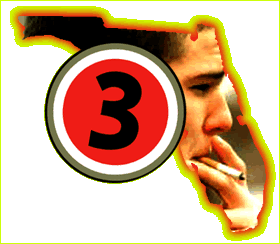
In Florida, where there's no regular crime to worry about, plainclothes cops cruise the palm-lined swamp suburbs looking to bust kids puffing on cigarettes.
It would be convenient at this point to say Florida's smoke patrol was launched "in the wake of Columbine," as every news story about teen-agers (except for Britney Spears profiles) is now required by federal law to say "in the wake of Columbine" at least once.
But the Alligator State, or whatever they call it, has been in the cigarette-cop business for a year and a half. In this land of heavily armed anti-Castro militias, drug-trafficking American Airlines ground crews, shabby tract homes that collapse at the mere mention of a hurricane, Russian arms dealers, and an Orwellian town built by the Walt Disney Corporation, you'd think there were more pressing problems than a few kids lighting up.
There's one major difference in this crime-fighting priority: Those fighting Florida's teen-smoking crisis have a $13 billion bankroll for these ludicrous programs -- a result of the massive settlement paid to the state by tobacco companies. At least two counties in the Swamp State have special juvenile court sessions just for apprehended smokers. And the law is draconian... If you're under 18 and collect three citations for smoking, you can't get a driver's license.
As 17-year-old Travis Pilcher said when he was nabbed under the watchful eye of CBS' 60 Minutes cameras, "This is a major bum."
While 42 states have laws on the books prohibiting under-18 kids from sucking smoke, Florida is the only state aggressively prosecuting the little punks with the "three strikes/no driver's license" penalty. As can be expected, Utah cops are also writing tickets when they catch little jack-mormons indulging in the sin of smoke. But in most of the states in this foul nation, cops have better things to do than chase teenaged smokers.
This is likely to change. "Lifestyle Cop" used to be a comical insult against the Birkenstocks types who told you not to eat steak or wear furs or flush the toilet. As the End Times come ever closer, Lifestyle Cops are real police, funded by lifestyle lawsuits -- with settlements increasingly going into the bank accounts of state governments. And teenagers, the piñatas of modern American life, will keep getting dicked around until they're finally forced into savage rebellion against municipal court judges, patrolmen, SWAT teams, high-school security guards, Prozac-addled moms and Viagra-crazed dads -- Everybody in Bulletproof Vests.
The popular phrase among cops, judges and nervous state legislators these days is that "driving is a privilege, not a right." And while most people can agree that dangerous drivers shouldn't have a license -- even if they continue to drive -- punitive withholding of licenses for non-driving offenses is something adults would never tolerate. Kids, as usual, have no rights and few legal privileges.
Holdouts are rare. A singular example is Wyoming, where the state Supreme Court is sticking to a 1992 ruling dealing with the seizure of driver's licenses from underage drinkers. In Johnson v. State, the Wyoming court struck down a statute that took licenses from kids cited for booze -- but not from drivers between 19 and 21, the latter being Wyoming's legal drinking age.
In the rest of the country, justice for the sake of teen smokers and boozers is about as popular as child rape.
The bigger issue -- even if there's no bigger issue to a kid than being denied a driver's license -- is the effectiveness of this anti-smoking crusade in Florida.
As a proud smoker, I've got no problem with people puffing if that's what they like. Obesity and sober car wrecks kill more people in America than cigarettes ever will, but nobody's clamoring for a general ban on Doritos, Ding Dongs and minivans (even if that's a fine idea). But I'm no supporter of the tobacco industry, a dirty business that's among the top contributors to the grim mess known as American democracy. And there is clear evidence showing the cigarette corporations happily backed Florida's teen-smoking cops.
While favoring laws that make workplaces and public buildings smoke-free, the major anti-smoking organizations in this country -- the American Lung Association and American Cancer Society -- are against laws that outlaw smoking in general. This is simply because they know Americans love to use and abuse whatever the government has suddenly decided is criminal. Prohibition was a pretty good lesson, and the failed drug war is a much uglier example, even if few politicians will honestly talk about this catastrophe.
So it should be no surprise that the Philip Morris company -- which, with $5.5 million in bipartisan contributions since 1995, is the biggest soft-money source for U.S. legislators -- fully supported Florida's teen-smoking crackdown. State Rep. John Morroni had a buddy on hand at the public signing ceremony for Florida's teen-smoking law: Philip Morris lobbyist John French.
Bill Godshaw of Smoke-Free Pennsylvania told 60 Minutes that Florida's law was a "terrible idea" because the easiest way to make rebellious young punks light up is to tell them it's illegal.
And as advertising critic Bob Garfield told the Orlando Sentinel last month, "If you can figure out how to make cigarettes uncool, God bless you."
The last thing the tobacco industry wants is for smoking to be uncool.
Ken Layne edited Tabloid.net and now works on the foreign desk at United Press International in Washington. His columns have appeared in Mother Jones, the Online Journalism Review, the Los Angeles Daily News, Sydney's Daily Telegraph and other publications around the world.
